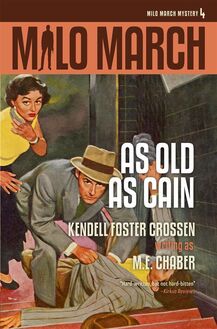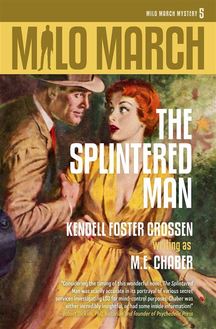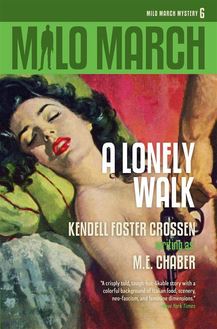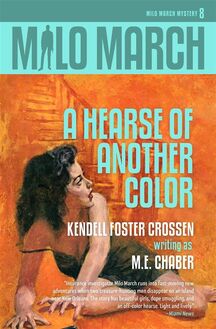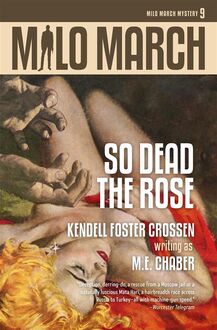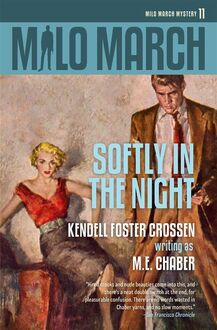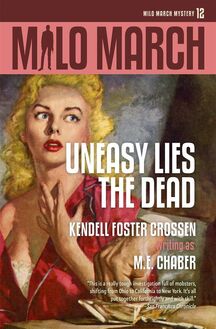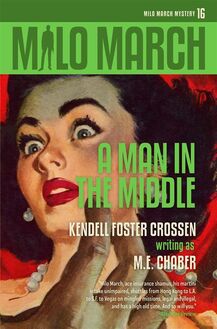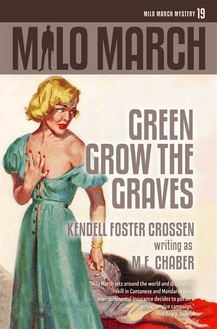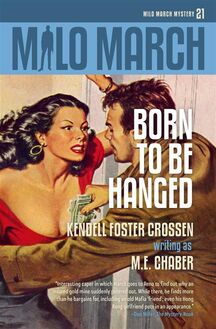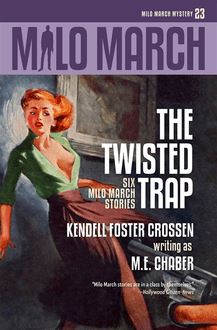Milo March #6 , livre ebook
104
pages
English
Ebooks
2020
Vous pourrez modifier la taille du texte de cet ouvrage
Obtenez un accès à la bibliothèque pour le consulter en ligne En savoir plus
Découvre YouScribe en t'inscrivant gratuitement
Découvre YouScribe en t'inscrivant gratuitement
104
pages
English
Ebooks
2020
Vous pourrez modifier la taille du texte de cet ouvrage
Obtenez un accès à la bibliothèque pour le consulter en ligne En savoir plus
Publié par
Date de parution
08 juin 2020
Nombre de lectures
5
EAN13
9788835875536
Langue
English
Although the case is quickly closed by the police, the whispers of Rome will not be silenced. They insist that the girl was murdered, that she’d been consorting with VIPs at a wild drug party, that she was pregnant and the guilty man did not want any trouble. It is rumored that politicians made the police hush up the truth, lest a scandal topple the Christian-Democrat government, allowing the Communists to take over.
Milo is warned to leave the case alone. If he persists, he may find himself arrested, he may get orders from his own American Embassy, or he may even be killed by someone… or some thing. All of this may happen if he says out loud that a girl of no importance died because someone wanted her dead. But the question—and the shocking surprise—is who actually killed her?
A Lonely Walk was inspired by the true story of Wilma Montesi, whose death in 1953 led to a scandal that rocked Italy with revelations of corruption in high places. The real-life case remains unsolved death to this day. Not so Milo’s investigation of the girl who took a lonely walk—until Death came to keep her company.
Publié par
Date de parution
08 juin 2020
Nombre de lectures
5
EAN13
9788835875536
Langue
English
A Lonely Walk
by
Kendell Foster Crossen
Writing as M.E. Chaber
With an Afterword by Kendra Crossen Burroughs
Steeger Books / 2020
Copyright Information
Published by Steeger Books
Visit steegerbooks.com for more books like this.
©1984, 2020 by Kendra Crossen Burroughs
The unabridged novel has been lightly copyedited by Kendra Crossen Burroughs.
All rights reserved. No part of this book may be reproduced or utilized in any form or by any means, electronic or mechanical, without permission in writing from the publisher. The scanning, uploading, and distribution of this book via the Internet or via any other means without the permission of the publisher is illegal and punishable by law.
Publishing History
Magazine
As “The Bodies Beautiful of Rome,” Cavalier , July 1957 (vol. 5, no. 49), pp. 44–47, 59–77. Illustrated by Bob Schulze. A condensed version.
Hardcover
New York: Rinehart & Co., October 1956.
Toronto: Clarke, Irwin & Co., 1956.
London: T. V. Boardman (American Bloodhound Mystery #177), 1957.
Paperback
New York: Ace Double #D-225, 1957. Cover by Rudy Nappi. (Back-to-back with Loser by a Head by Harry Giddings.)
New York: Paperback Library (63-1421), A Milo March Mystery, #12, September 1970. Cover by Robert McGinnis.
For Martha:
Omnia vincit Amor.
—Virgil
And for so many:
E lascia pur grattar dov’è la rogna.
—Dante
Author’s Note
This is a story of the Rome of today, or tomorrow, but in the same way, although offered as a tale of melodrama and suspense, it is a story about you and me. What happened to Anna Maria Pericoloso and Riccardo Balena and Milo March could happen to us. Because of this, there are many real things in this novel, many real people, and many real places—and I hope much reality. The rest, while no less real in one sense, is the result of the author’s imagination. Aside from those characters who appear under the names by which you know them from your daily newspaper, none of the characters is meant to portray any person living or dead.
M.E.C.
Before the Beginning …
The beach was quiet in the night. There were miles of white sand, turned silver by the moonlight. The waves of the ocean were gentle with the hour of sleep, washing softly over the sand. The country slept—except for those who were a part of the night—except for those who used the night as a blanket to cover deeds that were better left unspoken and undone.
The car huddled against the rim of the road. They carried their burden across the sand toward the ocean. Their feet sank into the sand, the grains spilling into their shoes so that they cursed softly to themselves. They did not worry about tracks, for there had been many feet at the beach that day, but they were not accustomed to sand in their shoes. It made them uncomfortable. They were men of the night—but of the closed night where the floors were hard and the walls solid.
A few feet from the water, they placed her on the sand. Her face was up, and as they drew away, the moonlight brushed its silver over her bare body—over the breasts, firmer now in death, over the gentle sloping belly and over the loins that would never again writhe in passion. No matter what was to come after, this was her first funeral, and the soft light from the moon did well by her.
They started to leave, and their feet kicked up little spurts of sand so that some of the golden grains spilled on her breasts. One of the men turned back to brush the sand away. He liked everything to be clean and orderly and systematic.
One
The man made one last dab with his brush at the sign on the door and quit. He gathered up his brushes and his paint, grunted at me, and left. I stood in the corridor for a minute, just admiring the sign: March’s Insurance Service Corp.
That’s me. The name’s Milo March. I’m an insurance investigator. Or insurance detective, if you like the word better. Which means that I get everything thrown at me that cops do—plus what the cops throw—without getting much of the credit. But the pay is better.
This was my first try on my own. I’d been working for an outfit in Denver, Colorado, for years. Finally, I’d gotten fed up with taking orders and making some other guy’s bank account fat. Most of the insurance companies knew me, and several of them said they’d throw me some work. I moved to New York and took a little office on Madison Avenue, deep in the heart of the Martini Belt. A private office and a reception room and enough furniture to get by, including an empty filing cabinet. The man had just finished painting the name on the door and I was open for business. As soon as I made a couple of cases, I’d hire a receptionist. Blond and well stacked. At least, the view would be good on dull days.
I went into the office and sat behind the desk, trying to feel like an executive. It didn’t work. I said to hell with it and opened the bottom drawer. There was a bottle of Canadian Club and some paper cups there for an emergency. Not feeling like an executive was an emergency. I poured myself a drink and sipped it, wondering how long I’d have to wait and if my bank account would hold out. I’d sent out cards with my address and phone number two days earlier.
The phone rang.
I snatched my hand back from the receiver and let it ring twice more before I picked it up.
“March’s Insurance Service Corporation,” I said, trying it on for size. It felt a little heavy.
“Milo?” a man asked.
“Yeah,” I said. That sounded more natural.
“Martin Raymond,” he said. “Congratulations, boy.”
“Thanks,” I said, trying to sound polite. Martin Raymond was a big wheel at Intercontinental Insurance Company. I’d worked for them a number of times and I’d sent him notice of my new setup.
“I think I might have a job for you, if you can handle it,” he said.
“I guess I can,” I said casually. “There are a couple of things on the fire, but there’s always room for one more. What’s the case?”
“How about running over here, boy, and I’ll sketch it out for you.”
I had to resist the impulse to drop the phone and start running immediately.
“Okay,” I said. “I sent the girl out for something. As soon as she gets back, I’ll be right over.”
“Roger,” he said and hung up.
I had another nip of the Canadian Club for luck. Then I locked the office and left. Intercontinental was about ten blocks away. I decided to walk so I wouldn’t get there too quickly.
Intercontinental had been one of the first insurance companies to move uptown.
They owned their own building on upper Madison Avenue. They were one of the big companies, and I was feeling pretty good about the call. If Martin Raymond wanted to, he could throw me enough business to keep me going most of the time.
The reception room was big and glossy. A lot of policy payments had gone into furnishing it. There was a redhead at the reception desk who looked as if she’d been custom-built, like the furniture. I liked her lines better. I told her who I was, and a few minutes later I was on my way back to the inner sanctum.
Martin Raymond was pretty custom-built himself. He looked like a dozen other vice-presidents. His clothes came from Brooks Brothers. His accent came from Harvard. His hair was prematurely gray. You could tell by looking at him that, according to the fashion of the moment, he would always have a Bloody Mary, an extra dry martini, or something-on-the-rocks. Raymond might like some other drink, but he’d always order whatever the other vice-presidents were drinking, just as he’d always buy the right sort of tie.
“Glad to see you, Milo,” he said as I came in. He gave me a manly, executive-type handshake. “Getting settled down in the big city?”
“Yeah,” I said.
“Good boy. You know, I’m glad you decided to open up for yourself here. We used to send a lot of cases out to Denver just because we knew you’d be working on them.”
“Thanks,” I said. I suddenly realized that this was the second time I’d thanked him. I’d better watch that or he’d think there was something wrong with me.
“Your passport in order?”
“Yeah,” I said. I tried not to look too interested. If he was interested in my passport, it meant a trip abroad—and a fat fee.
“How about your vaccination?”
“I was in Germany only a few months ago,” I said, “so it’s still good. Is Intercontinental handing out all-expense tours these days?”
“We are this time,” he said. “Wrap this one up quickly and maybe we’ll do it more often.”
“What’s the pitch?” I asked. “I thought you usually had the European stuff handled over there.”
“We did,” he said, “but I can’t say we’ve ever been very happy about it. Our branch offices have always handled any investigations, but most of the time it’s only meant that we paid the full freight. I’ve been wanting to make some other arrangements, and then your card and this case came in at the same time. We’ll try it this once and see what happens.&
